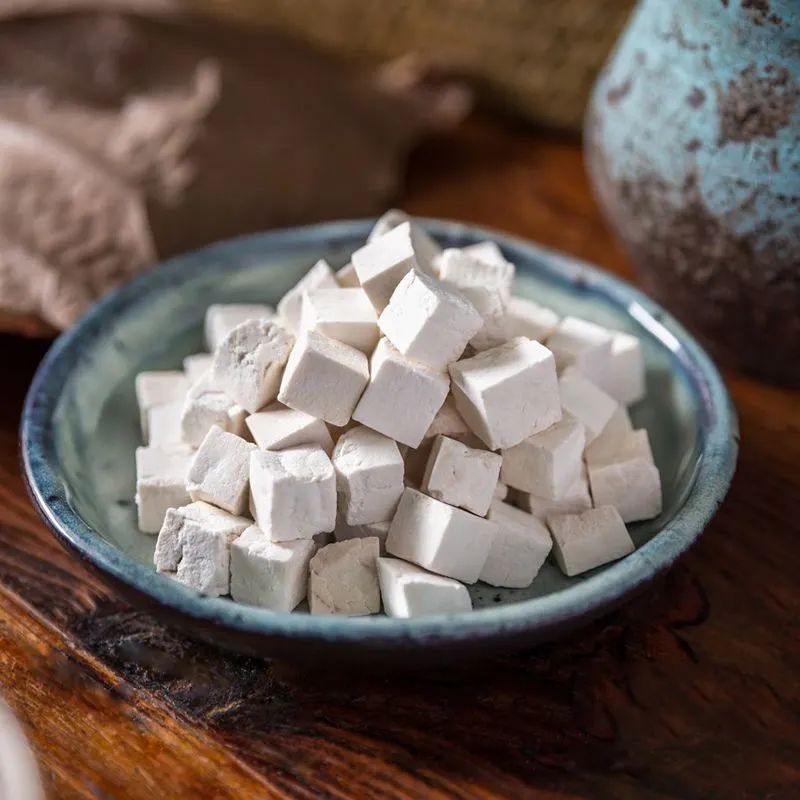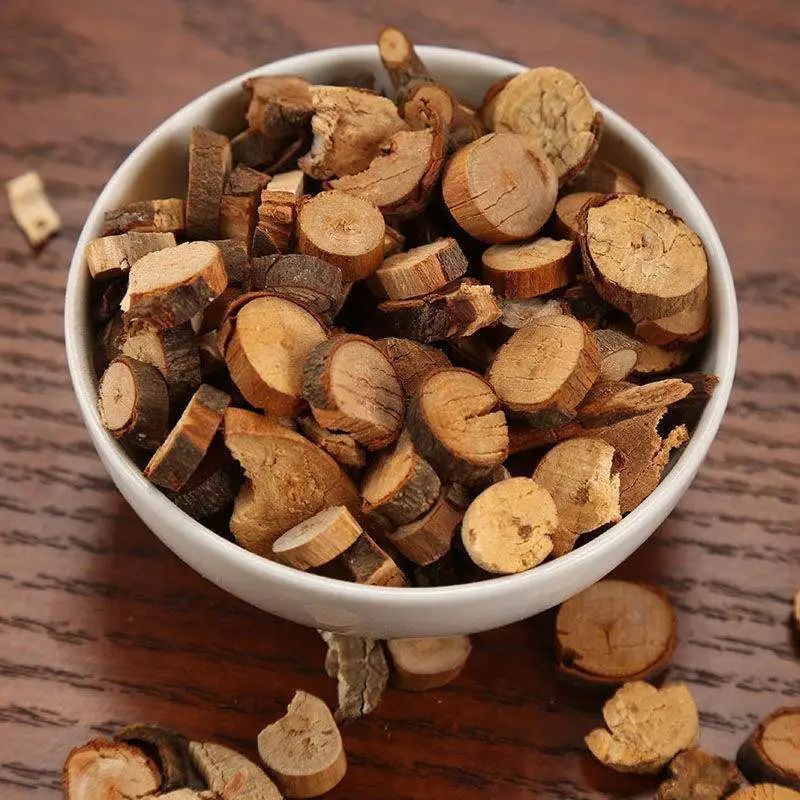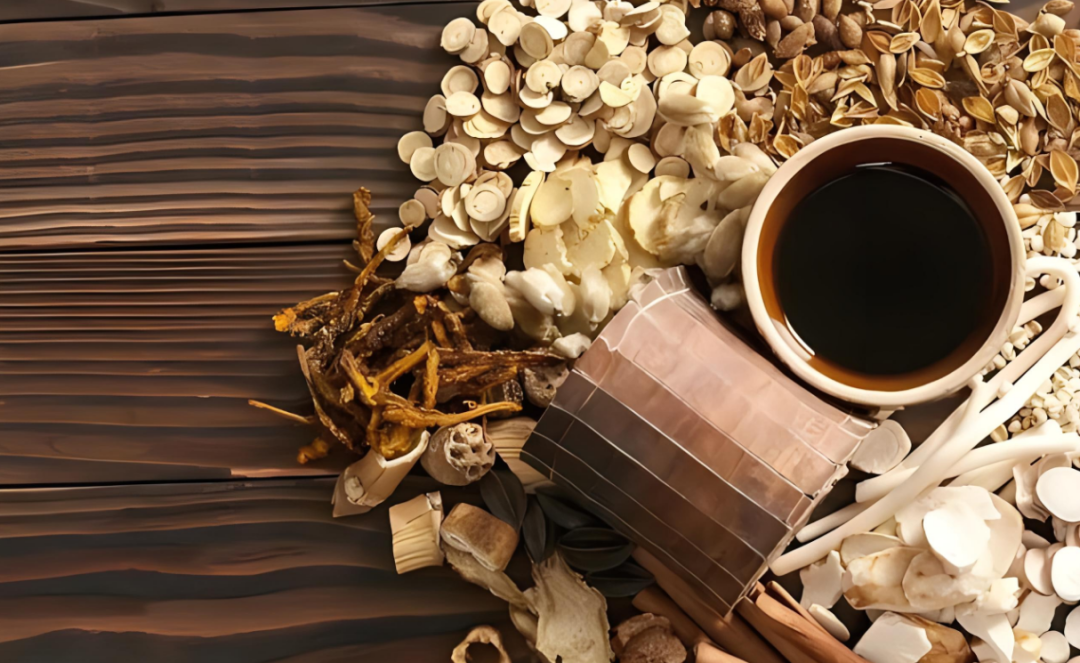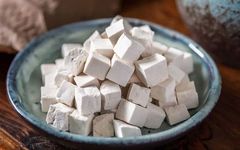Introduction:This formula closely adheres to the idea that “all dampness and swelling belong to the spleen”: Gui Zhi (Cinnamon Twig) moves from the spleen and stomach to the muscles and skin; Bai Zhu (White Atractylodes) rises from the spleen and stomach to elevate the clear yang; Fu Ling (Poria) descends from the spleen and stomach to eliminate damp turbidity; and Zhi Gan Cao (Honey-Fried Licorice) stabilizes the spleen and stomach.
Dampness elimination is a super popular health topic.
What do ordinary people discuss when they talk about dampness? They talk about edema and eczema, about red beans, coix seeds, winter melon, and lotus leaves, about promoting urination and draining dampness, and about skin and fur; while experts discuss dampness in terms of strengthening the spleen, elevating yang, and addressing the essence.
It is easy to remove cold, but difficult to eliminate dampness. Dampness is like oil in dough; once the oil has penetrated the dough, extracting it is as difficult as “climbing the Shu Road, harder than ascending to the sky.”
The cunning nature of dampness lies in its subtlety; it quietly invades your body without you noticing, and by the time you realize it, it is already too late.
It has already conquered your spleen and stomach, occupied your internal organs, and spread through every meridian and acupuncture point in your body. Moreover, dampness never fights alone; it recruits allies to assist in its tyranny. When combined with wind, it becomes wind-damp; with cold, it becomes cold-damp; and with heat, it becomes damp-heat.
Only the medical sage Zhang Zhongjing understands the dampness of the Chinese people. He deeply comprehended the essence of dampness and thus prescribed a formula that became the ancestor of all damp-eliminating formulas. All subsequent damp-eliminating prescriptions are derived from this foundational formula, which is Ling Gui Zhu Gan Tang (Poria, Cinnamon Twig, Atractylodes, and Licorice Decoction).
Let’s take a look at the composition:
Original Formula: 4 taels of Fu Ling, 3 taels of Gui Zhi, 3 taels of Bai Zhu, 2 taels of Zhi Gan Cao
Ling Gui Zhu Gan Tang consists of Fu Ling, Gui Zhi, Bai Zhu, and Zhi Gan Cao, with each ingredient serving a specific role.
Fu Ling

Fu Ling is a remarkable herb. How remarkable is it? Historical evidence shows that it is the most commonly used herb in all prescriptions from ancient times to the present. Fu Ling, one of the nine great medicinal herbs, is neither warming nor drying, nor cold nor hot; its nature is very mild. The damp-eliminating effect of Fu Ling is relatively slow, utilizing its sweet and bland nature. Unlike coix seeds, which are more aggressive, Fu Ling descends and can expel water-damp from the middle jiao (spleen and stomach) through urination.
Gui Zhi
Gui Zhi is the soul of this formula; without it, the formula would be bland and unremarkable. If Fu Ling is the most commonly used herb in all prescriptions, then Gui Zhi is the most frequently used herb in all classical formulas. Zhang Zhongjing was so fond of Gui Zhi that it appears in cases of both cold and heat, deficiency and excess, as well as in exterior and interior syndromes.

Bai Zhu
Bai Zhu is also a master at strengthening the spleen and eliminating dampness. Its flavor is very aromatic; it can awaken our spleen and stomach like Gui Zhi, and it can also eliminate dampness like Fu Ling, but its medicinal properties ascend. Bai Zhu transforms the water-damp of the middle jiao (spleen and stomach) into the fluids needed by the body.
Zhi Gan Cao
Gan Cao (Licorice) is well-known for its primary effects of tonifying the middle and benefiting qi, harmonizing various herbs. Zhi Gan Cao is prepared by roasting or honey-frying Gan Cao, which removes its heat-clearing and detoxifying effects while enhancing its qi-tonifying properties.
What role does Zhi Gan Cao play in this formula? First, it harmonizes the various herbs; second, it rescues the fluids. Since Gui Zhi and Bai Zhu are relatively warming and drying, and Fu Ling promotes urination, to prevent excessive fluid loss, Zhi Gan Cao is added to counterbalance.
The brilliance of Ling Gui Zhu Gan Tang goes beyond these aspects; this formula also encompasses three methods of eliminating dampness.
1. Draining Dampness
Draining dampness, also known as promoting urination, simply means using damp-draining herbs to expel the damp turbidity directly from the body through urination. Over the years, the damp-eliminating ingredients we have pursued, such as red beans and coix seeds, are precisely this.
Red beans and coix seeds are both damp-draining ingredients; they initially have some effect, but gradually lose their efficacy. Moreover, most damp-draining herbs are cold in nature, and long-term consumption can harm the spleen and stomach, exacerbating dampness.
Fu Ling in “Ling Gui Zhu Gan Tang” also drains dampness, but its advantage is that it is mild and does not harm the spleen and stomach.
2. Permeating Dampness
How should we understand permeating dampness? Permeating means slowly seeping out.
For example, we often say that a person’s face is seeping fine beads of sweat; this means that the dampness is being expelled through sweating. By using herbs that release the exterior and induce sweating, we allow our dampness to slowly seep out from every pore of the body.
Permeating dampness requires strengthening our heart yang. Some people have insufficient heart qi and weak heart yang, making it difficult for them to sweat, even in hot weather when others are sweating profusely. At this time, heart conditioning is necessary. Sweating is an important channel for detoxification; if one cannot sweat, how can dampness be eliminated?
Gui Zhi in “Ling Gui Zhu Gan Tang” can strengthen heart yang, release the exterior, and permeate dampness. Moreover, Gui Zhi can also eliminate dampness by elevating yang. Dampness is essentially a type of yin evil. Gui Zhi is like the sun in the sky; when the sun rises, the dampness on the ground quickly disappears without a trace.
3. Drying Dampness
Drying dampness, as the character “dry” suggests, is related to fire, so we use warming and tonifying herbs to dry dampness. Consider the concept of drying dampness: when a towel is placed over a fire, does the moisture in the towel evaporate? Then, when we place the dry towel on a table, does it absorb the water on the table? This is drying dampness.
Who dries dampness? Bai Zhu in “Ling Gui Zhu Gan Tang” is a master at drying dampness.
Now, one might say that merely seeing dampness and eliminating it is treating the symptoms; how can we treat the root cause? That is to cut off the source of dampness. Otherwise, if you eliminate dampness while the source continues to produce it, aren’t you wasting your efforts?

How to treat the root cause? In the Five Elements of Traditional Chinese Medicine, who overcomes water? It is earth. What is this earth? It is the spleen, which belongs to earth. Therefore, to fundamentally eliminate dampness, one must strengthen the spleen. The Huangdi Neijing states, “All dampness and swelling belong to the spleen,” indicating that the source of dampness is the spleen. To cut off the source of dampness, one must properly regulate the spleen and stomach.
What should we use to strengthen the spleen? Bai Zhu is the best choice, and Zhi Gan Cao can assist.
Let’s summarize Ling Gui Zhu Gan Tang: Fu Ling acts to drain dampness, expelling our dampness through urination.
Gui Zhi acts to permeate dampness, strengthening our heart yang, releasing the exterior, and allowing our dampness to seep out through the skin.
Bai Zhu acts to dry dampness, transforming the water that our body can utilize into vapor, just like a towel drying over a stove.
Zhi Gan Cao acts to strengthen the spleen, firmly guarding our spleen and stomach, while Bai Zhu also helps to strengthen the spleen.
This formula closely adheres to the idea that “all dampness and swelling belong to the spleen”: Gui Zhi moves from the spleen and stomach to the muscles and skin; Bai Zhu rises from the spleen and stomach to elevate the clear yang; Fu Ling descends from the spleen and stomach to eliminate damp turbidity; and Zhi Gan Cao stabilizes the spleen and stomach.
Thus, one might say that merely seeing dampness and eliminating it is treating the symptoms; how can we treat the root cause? That is to cut off the source of dampness. Otherwise, if you eliminate dampness while the source continues to produce it, aren’t you wasting your efforts?

To eliminate dampness, if the middle jiao is very hot, one can try Wu Ling San. If the middle jiao is cold, one can try Fu Ling Gan Cao Tang.

